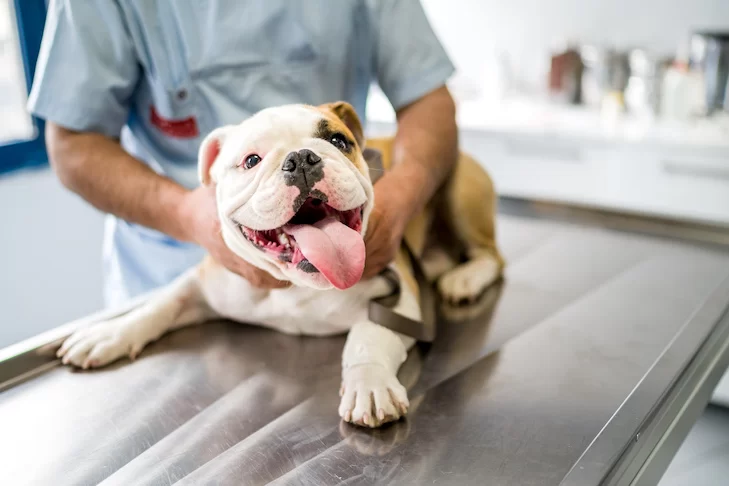How Often Should My Dog Get Vaccinated?
- The Importance of Dog Vaccination
- Recommended Vaccine Schedule for Dogs
- Core vs Non-Core Vaccines: What’s the Difference?
- Vaccination for Puppies: What You Need to Know
- Keeping Your Dog Vaccinated: Tips for Success
- Where to Get Your Dog Vaccinated
1. The Importance of Dog Vaccination
Vaccinating your dog is one of the most crucial aspects of responsible pet ownership. Not only does it protect your dog from serious diseases, but it also helps prevent the spread of illnesses to other animals. By maintaining regular vaccinations, you ensure that your dog has the best chance at living a long, healthy life.

1803 James L Redman Pkwy, Plant City, FL 33563, USA
See Details1.1 How Vaccines Protect Dogs
Vaccines stimulate your dog's immune system, teaching it to recognize and fight off specific diseases. This is important because some diseases, like parvovirus or distemper, can be fatal if contracted. Regular vaccinations create a “shield” of protection for your dog, significantly reducing the risk of infection.
1.2 The Role of Veterinary Professionals
Veterinary professionals play a key role in guiding you on the appropriate vaccination schedule for your dog. They can recommend vaccines based on your dog's lifestyle, health status, and the region you live in. Consulting a trusted vet ensures that your dog receives the right vaccines at the right time.
2. Recommended Vaccine Schedule for Dogs
The frequency of your dog’s vaccinations will depend on several factors, including its age, lifestyle, and health status. However, there are general guidelines to follow when planning your dog's vaccination schedule:
2.1 Puppy Vaccination Schedule
Puppies typically receive their first vaccinations at 6 to 8 weeks of age, followed by booster shots every 3 to 4 weeks until they are about 16 weeks old. At this point, they will have received the core vaccines necessary for protection against serious diseases. After that, annual boosters are generally recommended.
2.2 Adult Dog Vaccine Schedule
Once your dog reaches adulthood (around one year old), it will need booster vaccines to maintain immunity. Typically, a dog should receive booster shots for core vaccines such as rabies and distemper every 1 to 3 years, depending on the vaccine and local regulations.
2.3 Senior Dog Vaccine Schedule
As your dog ages, the frequency of vaccines may change. Senior dogs may need fewer vaccines due to their lower risk of exposure to certain diseases. However, it’s essential to have regular vet checkups to ensure your senior dog stays protected, especially if they have weakened immune systems.
3. Core vs Non-Core Vaccines: What’s the Difference?
Not all vaccines are required for every dog. The distinction between core and non-core vaccines is important when determining which vaccines are essential for your dog’s health.
3.1 Core Vaccines
Core vaccines are the vaccines that are essential for all dogs, regardless of their lifestyle. These include:
- Rabies: Required by law in many areas, rabies is a fatal viral disease transmitted through saliva from infected animals.
- Distemper: A contagious viral disease that affects the respiratory, gastrointestinal, and nervous systems.
- Parvovirus: A highly contagious virus that causes severe gastrointestinal illness and can be fatal, especially in puppies.
- Adenovirus: A virus that can cause respiratory and liver infections in dogs.
3.2 Non-Core Vaccines
Non-core vaccines are optional but may be recommended based on your dog's lifestyle or geographical location. These vaccines include:
- Bordetella: Recommended for dogs who frequent kennels or dog parks, as it helps protect against kennel cough.
- Leptospirosis: A bacterial infection that can cause liver and kidney damage, transmitted through contaminated water or soil.
- Lyme disease: Spread by ticks, Lyme disease is a concern for dogs living in areas where ticks are prevalent.
4. Vaccination for Puppies: What You Need to Know
Puppies are especially vulnerable to disease, making their vaccination schedule crucial for their long-term health. Here's an overview of what you should know about vaccinating your puppy:
4.1 The Importance of Early Vaccinations
Vaccinating your puppy early ensures that they are protected from dangerous diseases like parvovirus and distemper. These diseases are more common and more dangerous in puppies, making timely vaccination essential.
4.2 Socialization and Vaccination
Many new dog owners are concerned about socializing their puppies before vaccinations are complete. It’s important to ensure that your puppy is exposed to other dogs in a controlled, safe manner. Puppy classes that are held in clean, safe environments can help balance socialization with safety.
5. Keeping Your Dog Vaccinated: Tips for Success
Once your dog has received their vaccinations, keeping track of their vaccination schedule is crucial for ensuring they stay protected. Here are some tips:
5.1 Set Reminders for Boosters
Keep track of your dog’s vaccination schedule and set reminders for booster shots. Many veterinarians offer reminder services, or you can set alerts on your phone to make sure you never miss an appointment.
5.2 Regular Vet Checkups
In addition to vaccinations, regular vet checkups help monitor your dog’s overall health. These visits allow your vet to assess your dog’s risk factors and recommend additional vaccines as necessary.
6. Where to Get Your Dog Vaccinated
To ensure that your dog is getting the best care possible, it's important to choose a trusted veterinary clinic. Hidden Brook Veterinary offers comprehensive vaccination services to keep your dog protected from diseases and healthy for years to come.











